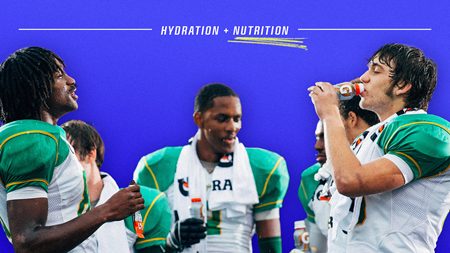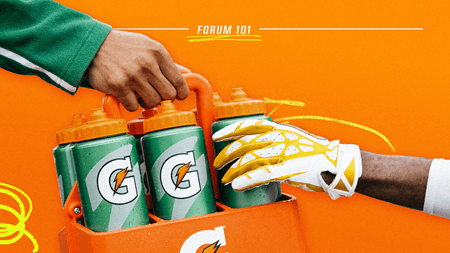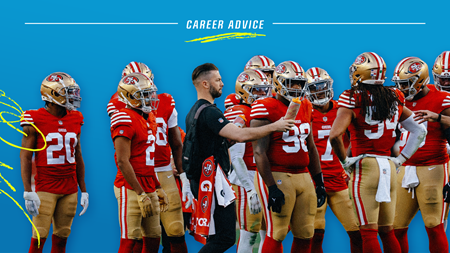Gatorade Fieldhouse latest

AMA with a Minnesota Vikings Performance Coach
Marquis Johnson, M.A., CSCS, SCCC, is an Assistant Performance Coach for the Minnesota Vikings, entering his fifth season with the team and sixth in the NFL. Marquis plays a key role in the Vikings strength staff receiving a stamp of approval when the NFL Players Association released the results of its free agency report cards during each of the past three offseasons (2023-25). When he’s not working with the team, Marquis is also an avid runner who has completed numerous full and half marathons. Submit your questions below for Marquis by Friday, November 21. He’ll be on throughout the week to respond to your questions!
1 Comments
-19 days ago
Books That Have Influenced Your Career
On 12/21/2024 at 2:02 PM, ConnorAgnew said: I am an avid reader and love to find new books that can help with my career. What are some books that you have read that have influenced your career and how you work with your athletes? Personally, my two favorite books have been "It Takes What It Takes" by Trevor Moawad and Andy Staples and "Deep Work" by Cal Newport. "It Takes What It Takes" lays out the concept of neutral thinking (not getting too high with highs and too low with the lows) and how it can be applied to athletes. It has proven to be invaluable in my conversations with athletes and I will even have some of my athletes read it with me to help their mental games. "Deep Work" dives into how to get the most out of your work day and complete large projects in quick fashion without having to over-exert yourself. I have modeled my work habits after Cal Newports suggestions and I feel it has drastically increased my productivity. I'm excited to dive into the books y'all recommend! Reading is how I spend the majority of my time outside of work. Beyond being an escape from the daily grind, I love reading books I can apply to my work and use to improve my relationships with athletes. The most influential book I have read recently is "Start with Why" by Simon Sinek. It is a great self help book for leaders but also is applicable to daily decision making.
18 Comments
10 months ago

😴 Seventeen Hours Awake = 0.05% BAC. How Do You Stay Sharp?
Here’s a surprising fact: being awake for 17 hours straight can impair your performance as much as having a blood alcohol level of 0.05% — and after 24 hours , it’s equivalent to 0.10%, which is legally drunk in most states. We often recognize the risks of alcohol on reaction time and decision-making, but fatigue can be just as dangerous — especially for athletes, coaches, and professionals who pride themselves on pushing through. Sleep loss affects coordination, focus, and recovery, and it raises the risk of errors and injury. The takeaway: recovery is not optional. Prioritizing sleep protects both performance and safety. Consistent schedules, short restorative naps when truly needed, and respecting the body’s limits are part of smart training, not weakness. How do you help your athletes (or yourself) protect sleep when schedules get demanding? Share what’s worked in your programs or routines. Joanna Fong-Isariyawongse, MD Neurologist | Sleep and Performance Expert | University of Pittsburgh
1 Comments
2 days ago

🌙 What Sleep Habits Actually Work for You and Your Athletes?
We all talk about “sleep hygiene,” but what strategies really make a difference in the real world? I’m curious to hear what you’ve found most effective for improving sleep quality and consistency — for yourself, your athletes, or your students. Do you emphasize: ☀️ Morning sunlight exposure to reset the body clock? 📵 Limiting screen time before bed? 🕐 Keeping a consistent bedtime routine? 🌡️ Adjusting room temperature or light levels? 🧘 Relaxation or mindfulness before sleep? Share your go-to sleep hygiene practices and what seems to have the biggest impact on recovery, alertness, or overall performance. Your insights can help others translate the science of sleep into practical strategies for athletes, teams, and students. Joanna Fong-Isariyawongse, MD Neurologist | Sleep and Performance Expert | University of Pittsburgh
1 Comments
2 days ago

💤 How Does Sleep or Lack of It Affect Your Athletes? 🥇
Hi everyone, I recently co-presented a GSSI-sponsored ACSM webinar, The Hidden Cost of Sleep Loss on Nutrition and Performance (Oct 16, 2025) that explored how even modest sleep loss can disrupt appetite hormones, recovery, and training outcomes. We discussed strategies to help athletes protect their “sleep nutrition” just as they protect their diet and hydration. One major challenge that keeps coming up is early school start times. During puberty, the brain’s internal clock naturally shifts later, making it harder for teenagers to fall asleep early and wake up refreshed. Yet most U.S. high schools start before 8:00 AM, which means students are often waking up in the middle of their biological night. As a result, more than 80% of adolescents do not get enough sleep , and this chronic sleep loss affects academic performance, mental health, safety, and sports outcomes . ⏰ Many high school athletes begin training or class before 7:30 AM, often running on 5 to 6 hours of sleep. Research shows this affects reaction time, injury risk, metabolism, and mood. Sleep deprivation has been linked to slower reaction times, increased injury risk, hormonal imbalance, and reduced recovery capacity — all critical factors for young athletes striving to perform their best. Let’s start a conversation: 👉 How do early start times impact your athletes? 👉 Have you seen performance or recovery improve when they get more sleep? Joanna Fong-Isariyawongse, MD Associate Professor of Neurology, University of Pittsburgh
1 Comments
2 days ago
Optimal Nutrition and Hydration Practices for Sleep Promotion
Dr. Joanna Fong-Isariyawongse and I recently presented a session titled “The Hidden Cost of Sleep Loss on Nutrition and Performance.” During our discussion, we explored strategies for enhancing sleep quality and efficiency, as well as nutritional practices that may support better sleep. I’m curious—have you ever incorporated sleep-promoting foods or beverages to improve your sleep? We highlighted options such as tart cherry juice and kiwi fruit as potential aids. If you’ve tried any of these (or others), what was your experience? Did they help you fall asleep faster, stay asleep longer, or feel more refreshed the next day? Thanks for your thoughts in advance!
1 Comments
3 days ago

Sleep & performance
Great question! Sleep is one of the most powerful and most underused tools in an athlete’s training ****nal. I often tell athletes that sleep isn’t a break from training; it is part of it. It is the time when the brain and body rebuild, recharge, and adapt to all the stress they put in during the day. As someone who studies cognitive performance and neural recovery, I have seen how sleep shapes everything from reaction time to emotional control. The science is clear. When athletes do not get enough sleep, everything suffers. Reaction time slows, accuracy drops, decision-making falters, and injury risk goes up. One night of poor sleep can impair performance about as much as mild alcohol intoxication. I have seen this play out firsthand with professional athletes. When I talk to teams and high-performance professionals, I frame sleep as a trainable skill, something you can improve just like strength, speed, or nutrition. I frame sleep as a trainable skill, just like strength or reaction time, and I focus on performance-driven strategies rather than the usual “sleep hygiene” checklist. We talk about how to use light, temperature, and recovery cycles strategically. Studies show that when athletes focus on these basics, their sleep quality, reaction time, and recovery metrics all improve. I also encourage coaches and sports medicine staff to bring in a sleep specialist for a short workshop, because once athletes understand the science, they get it. They start to see sleep as an edge, not a chore. And when that shift happens, everything changes. They begin to protect their sleep the way they protect their training schedule. In the end, I remind them that it is not just how hard you train but how well you recover that separates good from great. Sleep is the hidden performance enhancer, completely legal, completely free, and completely essential.
3 Comments
13 days ago

When to start hydration?
24 hours before the event: Encourage them to start hydrating well the day before. Urine should be pale yellow — that’s an easy self-check. A good target is about half their body weight in ounces of water over the day (for example, a 150-lb athlete would aim for around 75 oz). They should sip throughout the day rather than chugging large amounts at once. 2–3 hours before competition: Have them drink 16–24 oz (about 500–700 mL) of water or a sports drink. This tops off hydration levels and gives the body time to process and eliminate excess fluid. 20- 30 minutes before start: A small top-up of 5–10 oz (150–300 mL) helps maintain hydration
3 Comments
4 months ago

Post Competition Hydration Recommendations
On 3/10/2025 at 9:38 AM, JordanAllen said: I find it hard to get my athletes to hydrate following games/competitions. Does anyone have helpful strategies that may help me influence my high school athletes to hydrate well after activity? Thank you in advance for the help. Hydration after games and competitions is one of the most overlooked aspects of recovery, especially among high school athletes. I’ve found success using a combination of education, habit-building, and environment-based strategies rather than just reminders. 1. Make It Practical, Not Just Informational: Most athletes know hydration is important but don’t feel the effects immediately. Try showing them the why — for example, tracking body weight before and after games to demonstrate fluid loss, or having them note how their energy or soreness levels change when they hydrate properly versus when they don’t. 2. Build a Routine Around It: Create a “post-game checklist” that includes refueling and rehydrating as standard, not optional. You can link hydration to something they already do, like stretching or team debrief. Example: “water + protein snack before we talk.” Consistency helps turn it into habit.
5 Comments
7 months ago

How do you define "Strong Enough" in Basketball?
The idea of being “strong enough” really depends on context — the athlete, their sport, their goals, and their history. I don’t think there’s a single universal threshold where strength stops mattering, but there is a point where building more strength provides less return for performance compared to other qualities like speed, skill, or durability. For example: Sport demands matter most. A powerlifter can never be “too strong” in their lifts because that’s the sport. But for a soccer or basketball player, once their strength supports efficient movement, injury prevention, and power output, additional maximal strength might not improve performance as much as focusing on agility, conditioning, or coordination. Training age plays a role too. For a young or novice athlete, increasing general strength almost always pays off. But for an experienced athlete, gains come slower and require more recovery — so the focus might shift toward maintaining strength while emphasizing speed and movement quality. Injury history also shapes the “enough.” Sometimes, continuing to chase heavier loads increases risk more than it adds benefit. In those cases, strength maintenance and balanced mobility or stability become more valuable. On 9/22/2025 at 5:49 PM, JordanForget said: Many coaches have heard the expression "how strong is strong enough?". Coaches may of course have differing opinions whether there is even such a thing as "strong enough" and what variables lead one to even begin considering such scenario. However, I'm curious how coaches view strength through some possible variables that come into play: previous injury, training age, sport demands, etc. So, when looking at your athletes, when do you begin to consider if an athlete is "strong enough"? Is is in a particular exercise, in which case you may choose to just change exercises? Or is there a threshold in which once an athlete passes, you deem there to be diminishing returns? I'm sure many of you can provide a wide variety of perspectives, based on experience, context, research, and general opinions. I look forward to hearing your thoughts. On 10/5/2025 at 10:40 PM, Hunter.Glas said: Great question Jordan! This is where context matters. I look at strength as a continuum. Its value changes based on an athlete’s training age, injury history, position, and current performance needs. A younger athlete or someone new to the weight room probably needs to build more raw strength. An athlete that squats double bodyweight doesn’t need to keep chasing heavier numbers. For them, it’s about how fast and efficiently they can use the strength they already have. We should ask ourselves “what’s actually limiting their performance”? If someone produces high levels of force and moves well in their sport but lacks explosiveness, then strength likely isn’t the issue. It might be how quickly they can express that force or how coordinated they are at speed. On the other hand, if they struggle to hold position, absorb contact, or control deceleration, they probably still need to build a stronger foundation. As coaches we should try to connect weight room progress to on-court performance. Track how strength improvements show up in jump tests, acceleration, change of direction, and overall durability. When those areas stop improving along with strength, that athlete is probably strong enough for now. From there, the focus should shift toward power, elasticity, and movement efficiency.
4 Comments
one month ago














